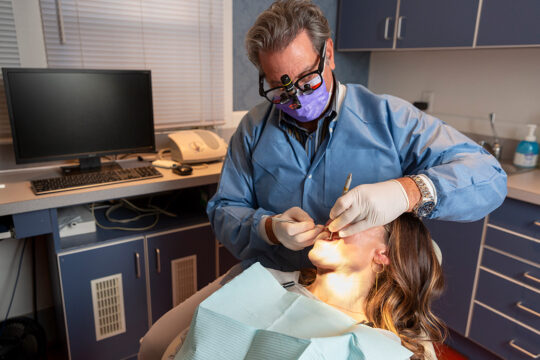Relieve Your Tooth Pain at Kennett Center for Advanced Dentistry
When a toothache strikes, it can disrupt your entire day, leaving you in pain and distress. At Kennett Center for Advanced Dentistry, we understand the urgency of treating emergency toothaches, and our dental team is here to provide immediate relief.
If you’re seeking treatment for toothaches or other emergency dental services, contact our Kennett Square emergency dentist by calling 610-444-6311. We’ll help relieve your pain!

What Causes of Emergency Toothaches?
Toothaches can stem from various issues, some of which require immediate attention. The most common causes of emergency toothaches include:
- Cavities: Tooth decay creates small holes in the tooth, exposing sensitive nerves and causing sharp pain.
- Infection: A bacterial infection, known as a dental abscess, can form at the root of the tooth or in the gums, leading to severe pain, swelling, and even fever.
- Fractured Tooth: Trauma or biting down on something hard can crack or chip a tooth, causing sensitivity and pain.
- Gum Disease: Inflammation of the gums due to plaque buildup can cause discomfort and lead to toothache.
- Impacted Wisdom Teeth: When wisdom teeth don’t have enough space to emerge properly, they can press against adjacent teeth, causing pain and discomfort.
- Teeth Grinding (Bruxism): Chronic grinding or clenching of teeth can wear down enamel and lead to toothaches.
If you’re seeking emergency dental care, contact our Kennett Square dentist today.
Toothache Symptoms
- Sharp or Throbbing Pain: Persistent pain in or around the tooth, often worsening with pressure or temperature changes.
- Swelling and Sensitivity: Swollen gums, sensitivity to hot or cold foods/drinks, and discomfort when chewing.
- Fever and Swollen Lymph Nodes: In cases of infection, systemic symptoms like fever and swollen lymph nodes may occur.
Actions to Take for Tooth Pain Relief
Rinse your mouth with warm water
A warm water mouth rinse is among the simplest and most potent first steps in handling a toothache. This method helps clean the mouth by washing away food particles, bacteria, and other debris that might be causing the pain. Warm water is particularly beneficial because it can soothe irritated gums and provide a temporary sense of relief. Cultivate a routine of gently yet thoroughly rinsing your mouth at the onset of dental pain.
Use dental floss
The use of dental floss can revolutionize the process of alleviating tooth pain. Often, food particles and debris get trapped between teeth, leading to irritation and pain. By flossing carefully, you can remove these particles and reduce the likelihood of inflammation and discomfort. Integrate flossing into your daily regimen for maintaining oral hygiene and forestalling future toothaches.
Over-the-Counter Pain Relievers
Over-the-counter (OTC) pain relievers present an accessible and potent choice for managing toothache pain.
- NSAIDs
- Acetaminophen
Topical Anesthetics
Topical anesthetics are a valuable tool for delivering localized pain relief directly to the affected area. Medicated gels and drops containing benzocaine can effectively numb the painful region in your mouth, offering temporary relief from tooth pain. These products work by blocking nerve signals, which helps to alleviate the discomfort associated with toothaches. Benzocaine gels and toothache drops are readily available and straightforward to use.
Cold Compress and Elevation
Using a cold compress on the outside of your cheek can significantly reduce swelling and provide temporary pain relief. The cold temperature helps constrict blood vessels, which reduces pain and inflammation. This method is especially helpful if the tooth has been chipped or knocked loose. Apply the compress for 15 to 20 minutes at a time, ensuring it’s wrapped in a clean towel to protect your skin.
Raising your head during sleep can contribute to reducing toothache pain by averting blood pooling in the affected area. This method can alleviate some of the pressure and discomfort associated with a toothache, allowing you to sleep more comfortably. Use an extra pillow to keep your head elevated and reduce the likelihood of waking up with intense pain.

When to See a Dentist for a Toothache
Persistent Tooth Pain
If the toothache persists for more than 1 to 2 days despite using over-the-counter pain medications and home remedies, visit our Kennett Square dentist. Persistent, severe toothache pain can indicate an underlying issue that requires professional diagnosis and treatment.
Severe Tooth Pain
Intense, throbbing pain that disrupts daily activities or worsens over time may indicate a more serious dental problem, such as an abscess or deep decay. Immediate dental evaluation is necessary to alleviate severe pain and prevent complications.
Swelling or Pus
Swelling around the tooth, gums, or face, accompanied by discharge of pus, suggests an infection that requires prompt dental treatment. Ignoring these symptoms can lead to the spread of infection and potential systemic health issues.
Fever and Swollen Lymph Nodes
Systemic symptoms like fever, chills, and swollen lymph nodes (especially under the jaw or in the neck) may indicate a spreading infection from a tooth abscess. Seek urgent dental care to prevent further complications.
Sensitivity to Temperature
Increased sensitivity to hot or cold foods/drinks, especially if it persists after the stimuli are removed, could indicate nerve involvement or dental decay. Our dentist can determine the cause and recommend appropriate treatment.
Pain with Chewing or Pressure
Pain that worsens when chewing food or applying pressure to the affected tooth suggests structural damage or infection within the tooth. Dental examination and treatment are necessary to address the underlying issue.
Recent Dental Work
If you have recently undergone dental procedures such as fillings, crowns, or root canal therapy, and experience persistent or new-onset pain, contact your dentist for evaluation. It could indicate complications or the need for adjustments.
Facial Trauma
If a toothache is accompanied by facial trauma, such as a broken tooth or injury to the mouth, seek immediate dental care. Prompt treatment can prevent further damage and address any underlying dental issues.
Preventing Future Toothaches
To prevent toothaches, do the following:
- Keep up with meticulous oral hygiene, such as brushing and flossing daily, using fluoride toothpaste, and rinsing with antiseptic mouthwash
- Maintain regular dental visits to our Kennett Square dentist
- Eat foods low in sugar
- Ask your dentist about sealants and fluoride applications

Frequently Asked Questions
At what point does a toothache become an emergency?
If your toothache lasts more than 1 to 2 days and causes severe pain or discomfort, it’s considered a dental emergency. This could signal an advanced cavity or an infected tooth that requires immediate attention.
What is the best immediate action for toothache relief?
The best immediate action for toothache relief is to rinse your mouth with warm water and use dental floss to remove any trapped debris. This can help alleviate the discomfort quickly.
Are there effective home remedies for toothaches?
Yes, clove oil, salt water rinses, and garlic are effective home remedies for temporary relief from toothaches by acting as natural disinfectants and reducing inflammation.
See Our Kennett Square Dentist for Dental Emergencies
Emergency toothaches demand timely attention and appropriate care to alleviate pain and prevent complications. To avoid making your pain worse and unnecessary emergency dental procedures, contact our Kennett Square dentist at the first signs of a severe toothache. Call us at 610-444-6311, and we’ll get you in as quickly as possible.
